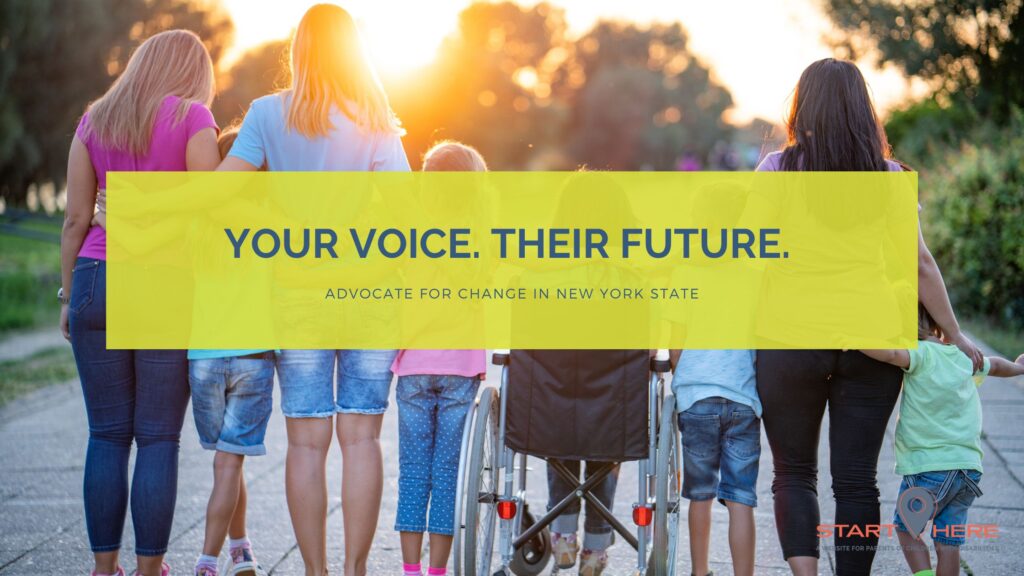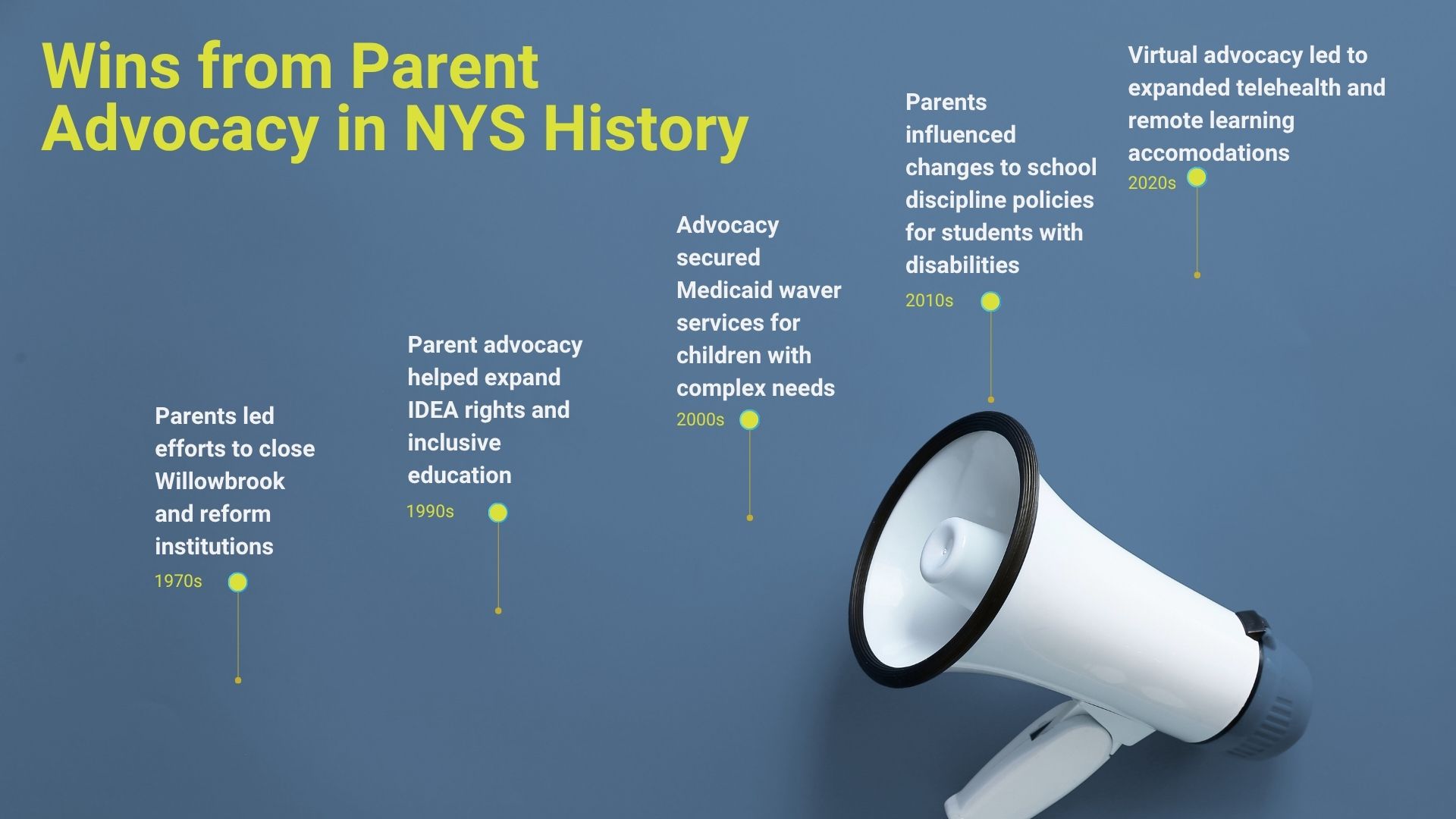
Why Now Is the Time
If you’re the parent of a child with a disability, you’ve already mastered the role of advocate, even if you haven’t realized it. Whether it’s in doctors’ offices, schools, or everyday life. But right now, the broader disability community in New York State needs your voice more than ever. Resources are uncertain. Funding is being debated. Programs are at risk. And the future of our children’s access to critical services is hanging in the balance.
But there are so many reasons for hope. When parents band together and demand that their children receive the services, supports, and opportunities they need to live full and meaningful lives, they create real change. Parent advocacy has a long, powerful history in New York—and it’s your turn to be part of it!

NYS Advocacy Roadmap 101: From Home to the Capitol
Advocacy isn’t just about showing up in Albany. It starts at home and can grow into statewide action. Here’s a roadmap to guide your efforts:
Start at the Doctor’s Office
- Ask for comprehensive evaluations and referrals.
- Keep detailed records of medical recommendations and denials.
- Speak up if your child’s needs are dismissed or delayed.
Advocate in Your Child’s School
- Understand your rights under IDEA (Individuals with Disabilities Education Act).
- Attend IEP meetings with confidence—bring a friend or advocate.
- Request services in writing and keep a paper trail.
- Push for inclusive programming and individualized supports.
Connect with Nonprofits and Local Organizations
- Join local disability rights groups, such as Parent to Parent NYS or the Advocacy Center.
- Attend workshops, support groups, and advocacy trainings.
- Share your story through their platforms.
Engage Your City or Town
- Speak at local board meetings and town halls.
- Advocate for accessibility in parks, recreation, and city programs.
- Encourage local investment in disability-inclusive initiatives.
Influence State Policy
- Know your State Assemblymember and Senator—call, write, and visit their offices.
- Join advocacy days in Albany (in-person or virtual).
- Submit testimony during state budget hearings.
- Follow and engage with the Governor’s Office on disability issues.
How NYS Funding Works—and How to Infiltrate It
The Budget Process
- New York’s governor proposes a budget each January.
- The legislature reviews and negotiates from January to April.
- Final budget is passed by April 1 (generally extenders are passed because the budget is not ready by April 1).
- Key players: NYS Division of Budget, State Education Department (SED), Office for People With Developmental Disabilities (OPWDD).
Your Role
- Meet with legislators during budget season.
- Share personal impact stories.
- Join statewide coalitions – Like CP State, IAC, & NYDA.
- Use budget hearings to demand funding increases.
- Call and email leadership from all branches.

For decades, parents of children with disabilities across New York State have been powerful agents of change. What started as isolated efforts has evolved into a united, unwavering movement demanding equity, inclusion, and access. When families come together—sharing their stories, supporting one another, and standing firm in the face of injustice—they create undeniable momentum. This collective power has reshaped policies, increased funding, and expanded services that support not just their own children, but generations to come.
The Power of Parents: Loud, United, and Unstoppable
The most impactful advocacy doesn’t happen in isolation—it’s born from connection. Across New York, parents have gathered in living rooms, community centers, school meetings, and at the Capitol, speaking with one voice for the needs of their children. They’ve fought for education rights, early intervention services, inclusive classrooms, and lifelong support systems. Their passion has changed laws and shifted mindsets. This timeline reflects just a few of the victories parents have achieved by showing up, speaking out, and refusing to be ignored. It is a testament to what happens when families organize not just around what’s wrong, but around what’s possible.
How to Get Involved: Big and Small Actions That Matter
Big Actions:
- Attend Advocacy Days.
- Organize a local parent advocacy group.
- Host forums or town halls.
- Launch a petition or campaign.
Everyday Actions:
- Call your legislator monthly.
- Post on social media about disability issues.
- Talk to other parents at your child’s school.
- Share your story with a nonprofit or the press.
- Organize on social media or with letter / call campaigns.
Current and Ongoing Advocacy Initiatives:
- Fully Funding Early Intervention Services
- Ensuring Inclusive Classrooms in Public Schools
- Expanding Medicaid Waivers for Children
- Creating Accessible Public Spaces and Transportation
- Guarding Against Budget Cuts to OPWDD and SED Programs
You can join these efforts—or build your own. Start a local accessibility audit. Survey families in your school district. Advocate for after-school care or summer camps that include all kids.
How to Be Heard
- Practice your story—keep it under 2 minutes.
- Bring solutions, not just problems.
- Show up with others—bring 3, 10, or 100 voices.
- Be persistent, respectful, and informed.

Your child deserves a future full of opportunity, respect, and inclusion. The systems may be flawed, but they are not unchangeable. The disability rights movement in New York was built by parents who refused to stay silent—and it will grow stronger with your voice.
This is your moment. Speak up. Speak out. Join hands with others. Because when families rise together, change follows.
Parents are the ones who see, firsthand, where the gaps in services exist. You know exactly where resources and energy need to go to make this state better, more inclusive, and more responsive to your child’s needs. If you don’t speak up, how will those in power ever know where to focus?
